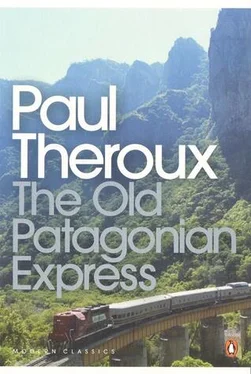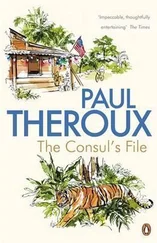Paul Theroux - The Old Patagonian Express - By Train Through the Americas
Здесь есть возможность читать онлайн «Paul Theroux - The Old Patagonian Express - By Train Through the Americas» весь текст электронной книги совершенно бесплатно (целиком полную версию без сокращений). В некоторых случаях можно слушать аудио, скачать через торрент в формате fb2 и присутствует краткое содержание. Год выпуска: 2008, Издательство: Penguin Books Ltd, Жанр: Путешествия и география, на английском языке. Описание произведения, (предисловие) а так же отзывы посетителей доступны на портале библиотеки ЛибКат.
- Название:The Old Patagonian Express: By Train Through the Americas
- Автор:
- Издательство:Penguin Books Ltd
- Жанр:
- Год:2008
- ISBN:нет данных
- Рейтинг книги:5 / 5. Голосов: 1
-
Избранное:Добавить в избранное
- Отзывы:
-
Ваша оценка:
- 100
- 1
- 2
- 3
- 4
- 5
The Old Patagonian Express: By Train Through the Americas: краткое содержание, описание и аннотация
Предлагаем к чтению аннотацию, описание, краткое содержание или предисловие (зависит от того, что написал сам автор книги «The Old Patagonian Express: By Train Through the Americas»). Если вы не нашли необходимую информацию о книге — напишите в комментариях, мы постараемся отыскать её.
The Old Patagonian Express: By Train Through the Americas — читать онлайн бесплатно полную книгу (весь текст) целиком
Ниже представлен текст книги, разбитый по страницам. Система сохранения места последней прочитанной страницы, позволяет с удобством читать онлайн бесплатно книгу «The Old Patagonian Express: By Train Through the Americas», без необходимости каждый раз заново искать на чём Вы остановились. Поставьте закладку, и сможете в любой момент перейти на страницу, на которой закончили чтение.
Интервал:
Закладка:
And this was only the beginning of Patagonia. We were as yet still travelling along the coast, around the Gulf of San Matías. One would hardly have known the sea to be so near, although in the middle of the afternoon what first appeared to be a lake came into view, grew fuller and bluer and proved to be the Atlantic Ocean. The land continued scrubby, the old salt water tides had made the soil more desolate by poisoning it.
We passed villages; they were named as towns on the map, but in reality no name would do. What were they? Six flat weatherbeaten buildings, of which three were latrines; four widely spaced trees, a lame dog, a few chickens, and the wind blowing so hard a pair of ladies' bloomers were flapping horizontal from a clothesline. And sometimes, in the middle of the desert, there were solitary houses, made out of mud blocks or dusty bricks. These were a riddle; they had the starkness of cartoons. The picket fence of branches and sticks- what were they enclosing? what were they shutting out? — was no aid to fathoming the purpose of such huts.
We came to San Antonio Oeste, a small town on the blue waters of the Gulf of San Matias, with the look of an oasis. About forty people got off the train here, since they could catch buses at the local depot to the towns farther down the coast of Patagonia, Comodoro and Puerto Madryn. Seeing that we were stalled, I got off and hiked up and down in the wind.
The waiter leaned out of the window of the dining car.
'Where are you going?'
'Esquel.'
'No!'
'Via Jacobacci.'
'No! That train is only this big!' He measured a small distance with his fingers.
In the United States and Mexico I had avoided telling people where I was going: I had not thought their credulity could take it. Then, in South America, I had mentioned Patagonia: the news was received politely. But here, the closer I got to Esquel, the more distant it was made to seem, and now it could have been farther away than ever. I got the message: no one ended a journey in such a place; Esquel was where journeys began. But I had known all along that I had no intention of writing about being in a place — that took the skill of a miniaturist. I was more interested in the going and the getting there, in the poetry of departures. And I had got here by boarding a subway train filled with Boston commuters, who had left me and the train and had gone to work. I had stayed on and now I was in San Antonio Oeste in the Pata-gonian province of Rio Negro. The travel had been a satisfaction; being in this station was a bore.
We continued south-west, making for the province of Chubut. The landscape was no longer green, even in that illusory way. It was halftones of brown and grey and the low ugly thorn bushes were sparser, with fewer leaves. There were small suffer plants beneath them, as hard and fan-like as coral. The soil was not pulverized enough to make mud-blocks. At great intervals there were houses, but these were made of logs; and it was surprising to see logs in a place where there were no trees. Hudson and other Patagonian travellers mention the bird-life — Hudson goes on for pages about the birdsong in the desert — but I saw nothing but oversize swallows and one hawk all afternoon. There were supposed to be rheas, flamingoes and egrets here, but when I grumbled to myself about not seeing them I was reminded of Thorn-berry in Costa Rica ('Where are the parrots and monkeys?') and stopped looking for them. It was astonishing how empty a place it was. Borges had called it dreary. It was not dreary. It was hardly anything. There was not enough substance in it for it to have a mood. A desert is an empty canvas; it is you who give it features and a mood, who work at creating the mirage and making it live. But I was incurious; the desert was deserted, as empty as I felt.
Fine dust poured through the windows and billowed in the corridor and settled in the little lobby at the centre of the sleeping car. There were men in the lobby, but those near the wall of the car were almost obscured by it. They were seven feet from me. I had never minded dust very much, but I found this hard to take. It had a way of trickling through the door-jambs and the cracks in the window frames and swelling in the car.
There were some surprises. I had given up all hope of seeing something growing in Patagonia when, at the town of Valcheta, I saw poplars fencing in a field of grapevines-a vineyard herein the desolate land; and an apple orchard. The small river at Valcheta explained it — it flowed from the south, from the volcanic tableland of the plateau. But Valcheta was a village, and it was clear from the villages farther east that they were there because of this northbound river. They had been founded where wells could be dug.
I had been getting out of the train at each stop, simply so that I could draw a breath. But as the day wore on it grew chillier, and now it was almost cold. The passengers remarked on the cold; they were used to the heavy air of Buenos Aires. They remained wrapped up in the dusty lobby, some with handkerchiefs over their mouths, making small-talk.
'How is the weather in Bariloche?'
'Rainy — very rainy.'
'Oh, sir, you are not telling the truth! You are being very cruel!'
'All right, the weather is lovely.'
'I know it is. Bariloche is so pretty. And we'll be there Tuesday morning!'
They had cameras. I almost laughed out loud at the thought of anyone bringing a camera here with the intention of taking snapshots of the sights. The very idea! You see an unusual feature of the landscape and you realize it is a mud puddle, given ribs by a breeze. The sun near seven was bright and low, and for a few minutes the foul stunted thorn bushes were beautifully lit and cast long shadows across the desert. There were scoops and eruptions far off, and the landscape became familiar. It was the brown eroded landscape you see in the illustrations on the back pages of a school Bible. 'Palestine,' says the caption, or 'The Holy Land', and you look: dust, withered bushes, blue sky, kitty litter.
At dinner that night I was joined by a young couple who had recently been to Brazil. They hailed from Buenos Aires, and I guessed they were on their honeymoon. It was sunset, the sky bright blue, bright yellow, the landscape black; and we had just arrived at the windblown station of Ministero Ramos Mexia. It was not on the map. The woman was talking: they ate hearty breakfasts in Brazil; there were a lot of black people there; everything was expensive. And outside the window, on the platform of Ministero, boys were selling walnuts and grapes.
Then the sun was gone. It was immediately cold and very dark, and the people near the train walked to the overbright lights which were hung on the station posts. They moved out of the darkness and settled near the light like moths.
Our dusty dining car seemed luxurious in comparison with this remote station. The young couple — a moment before they had been talking about the poverty in Brazil — became self-conscious.
Outside, a boy sang, 'Grapes! Grapes! Grapes!' He hoisted his basket to the window.
'They are so poor here,' said the lady. The waiter had just served us with steaks, but none of us had begun to eat.
'They are forgotten,' said her husband.
The people on the station platform were laughing and pointing. For a moment, I thought we might be cheated out of our guilt — the people in Ministero seemed fairly jolly. The train moved on, and then we attacked our steaks.
When this couple left and went back to their compartment, the conductor asked if he could sit down. 'By all means,' I said, and poured him a glass of wine.
'I have been meaning to ask you,' he said. 'Where did you get your free pass?'
I said, 'From a certain general.'
He did not pursue the subject. 'Argentina's expensive, eh? Guess how much I earn.'
Читать дальшеИнтервал:
Закладка:
Похожие книги на «The Old Patagonian Express: By Train Through the Americas»
Представляем Вашему вниманию похожие книги на «The Old Patagonian Express: By Train Through the Americas» списком для выбора. Мы отобрали схожую по названию и смыслу литературу в надежде предоставить читателям больше вариантов отыскать новые, интересные, ещё непрочитанные произведения.
Обсуждение, отзывы о книге «The Old Patagonian Express: By Train Through the Americas» и просто собственные мнения читателей. Оставьте ваши комментарии, напишите, что Вы думаете о произведении, его смысле или главных героях. Укажите что конкретно понравилось, а что нет, и почему Вы так считаете.












